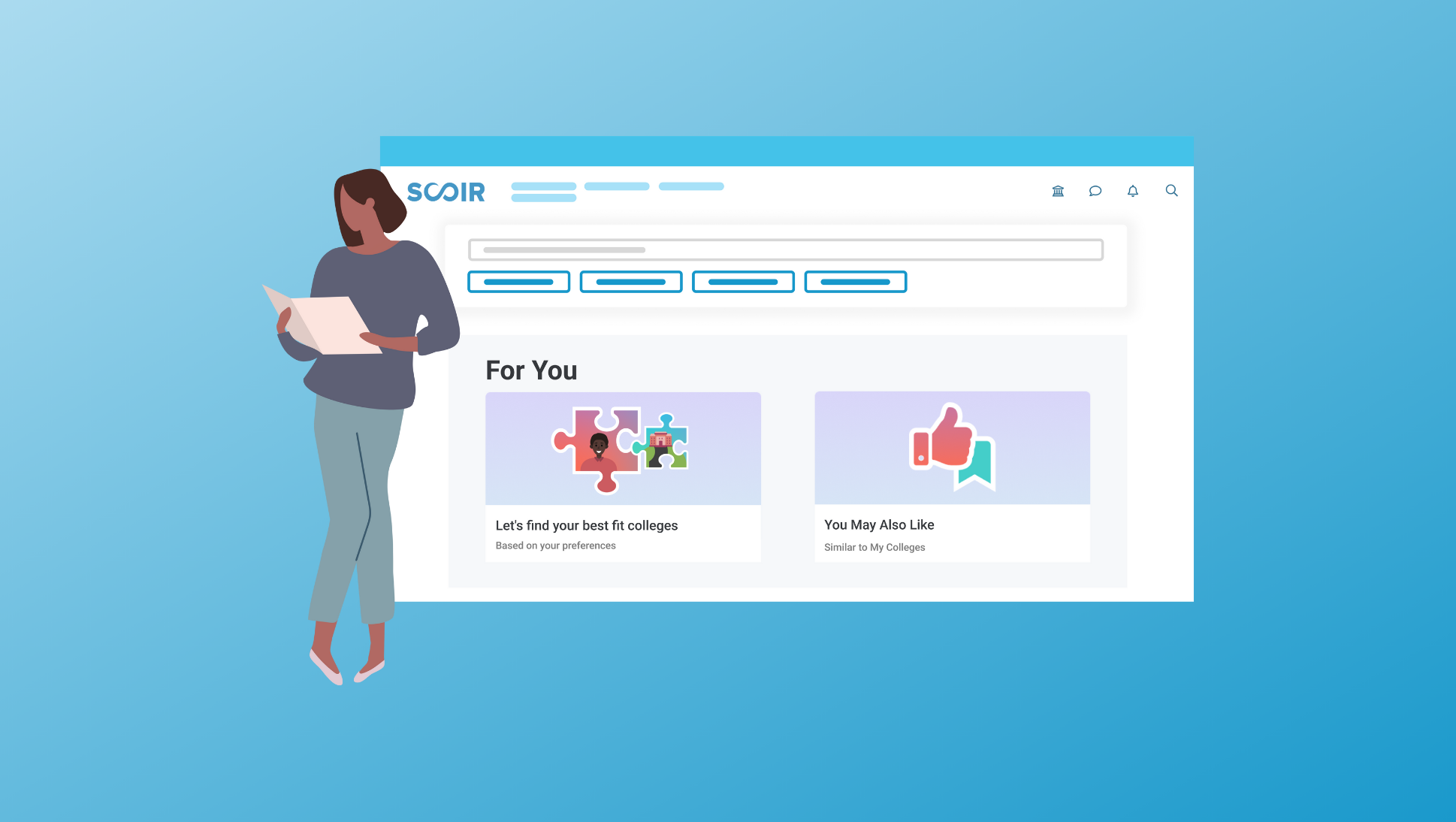5 min read
Navigating College Choices: Counselor Tips for Student and Parent/Guardian Harmony
This blog post is a recap of an Inside College Admissions podcast episode, hosted by Scoir. Listen to the podcast episode here.
Scoir is free for your students and for you. We also offer Advanced Solutions to help you better guide your students.
Access resources in the areas of test prep, essay support, and financial aid to better navigate every part of the admissions process.
We offer a flat 50% discount for each student who receives free or reduced lunch in your school or district.
Enjoy Career Readiness Early Access for grades 6-8, built to help you guide students and track progress in the early years of career learnings and activities.

Career development (certifications, courses & curriculum) for changemakers.
Our pricing is fair for schools of all sizes, transparent, and rewards those schools expanding access to underserved students.
Check out content and practical guides to help inform your enrollment strategies and programs.
6 min read
 Karen Miller
:
May 15, 2024
Karen Miller
:
May 15, 2024

College visits on your mind? Not sure how to prepare or what to expect?
In this article, we answer the top questions we hear from students about college visits!
Spring through summer is college visit season!
Summer is a great time to visit colleges since you'll likely have more flexibility with your schedule. Plus, it can be a great excuse for a summer trip or vaca!
If you're reading this in the winter or spring, know that spring break is a great time to plan visits to colleges you might be interested in attending. If you plan on taking a trip during your high school’s spring break, it’s best to go to the colleges’ websites and register for a campus tour sooner rather than later because these dates often fill up quickly. Since colleges’ spring breaks are usually different than high schools’ breaks, most campuses will be bustling with activity. This can be a great way to experience a typical day on campus while the college students are there!
However, you don’t have to wait until spring break to visit college campuses. In fact, if you live within an hour or two of colleges, feel free to start exploring locally in January and February.
If you are fortunate enough to be within driving distance or a train ride from different types of campuses, then take advantage of what is close to begin figuring out what type of college campus feels right for you.
If possible, try to visit a campus in a city, one in the suburbs, and one in a rural community. In addition, it’s worthwhile to experience campuses with different-sized student bodies: a smaller college with under 5,000 students, a medium-sized college with 5,000-15,000 students, and a large campus with over 15,000 students.
While you may not want to attend a college just down the street, these local schools can help you figure out what you like and dislike in a college. Then, you can start to narrow down your college list. As a result, when you decide to take longer trips to visit colleges, you can make the most of these opportunities.
As mentioned, it’s highly recommended that you sign up for the official campus tour not only because you will get a more comprehensive idea of the college but also because it shows demonstrated interest in the college (aka, you're actually interested in attending!). By showing a demonstrated interest in a college, they might feel better about admitting you.
However, if you cannot visit for financial reasons, you should contact the colleges to which you are applying to let them know about your situation and to find out if they have any opportunities, such as a Fly-In Program, that will either help to offset the cost or completely cover all expenses for your visit. In addition, some colleges offer special programs over specific weekends.
It’s important to note that you must apply to most of these programs as early as the summer before senior year. Therefore, it’s a great idea to start researching them now.
After you have scheduled an official tour, it’s a good idea to start investigating your options.
Either before or after the official tour, take some time to explore on your own. Below are some suggestions of things to do while on campus to get a good feel for the environment.
When you get back into your car, take a few minutes to debrief. You can print out this college evaluation form (shown below) to take notes, use the notes app on your phone, or write in a journal. Whatever method you use, it's important to spend 15-30 minutes evaluating your impressions after touring a campus. If not, all of the tours will eventually blend together and you may have a hard time remembering the specifics of what you liked and disliked about each college.
![]()

DORMS: ☆☆☆☆☆ (Overall Rating)
Things to Consider:
What did you think of the size of the rooms? How are the other amenities? What did you think about the bathrooms? Size? Location? Is there a common area? Study area? Do all freshmen live together or near each other?
Your Notes/Thoughts About the Dorms:

FOOD: ☆☆☆☆☆
Things to Consider:
How many cafeterias/food spots are there on campus? How was the quality of the food? If you have any specific allergies or food requirements, can they accommodate you? Details about meal plans.
Your Notes/Thoughts About the Food:

STUDENT BODY: ☆☆☆☆☆
Things to Consider:
If you spoke with anyone, what were their thoughts? Could you see yourself with the students? Did you get a sense of school spirit and pride?
Your Notes/Thoughts About the Student Body:

CLASSES/PROFESSORS: ☆☆☆☆☆
Things to Consider:
If you were able to sit in on a class, was it as you expected? Better? Worse? How engaged were the students? How did the classroom look and feel? If you were able to speak with the professor, what did you discuss?
Your Notes/Thoughts About the Classes/Professors:

EXTRACURRICULAR ACTIVITIES: ☆☆☆☆☆
Things to Consider:
Did you learn about any clubs or activities that might interest you? Did you notice any signs on bulletin boards with interesting events? Were you able to attend a sports game? How active was the student body?
Your Notes/Thoughts About the Extracurricular Activities:

CAMPUS: ☆☆☆☆☆
Things to Consider:
Did it feel too small? Too big? Just right? Did you like the style of architecture? Why or why not? What transportation services are available? Did the campus feel safe? Are classes within a major located in a specific area?
Your Notes/Thoughts About the Campus:


After you write down your thoughts, take a few minutes to email the faculty and staff to whom you’ve spoken. Then, when you return home, it’s a good idea to send them a handwritten thank you note and include specific things you spoke about or topics from the class that you found interesting. In addition, do not judge an entire college on the tour guide alone. Oftentimes, students will not like a college because they don’t like the tour guide. Remember the tour guide is one person out of hundreds to thousands on the campus. Instead of focusing on that person, use the time on campus to evaluate all aspects of the college.
Finally, once you have been accepted into college, it’s a great idea to visit the ones you are considering attending to have a final look before deciding. In fact, some colleges have programs specifically designed for prospective students to attend once they have been admitted.
During these final visits, be as detailed and thorough in your evaluation of the schools as possible. Since you have already visited each of them, reread your notes and think about what you would like to see again or learn more about while on your last visit before making a decision.
Now, you are in the driver’s seat and have the control. Take this opportunity to make the best decision for you!
This article was originally published on February 9, 2018. It was updated on May 15, 2024 for accuracy and comprehensiveness.

5 min read
This blog post is a recap of an Inside College Admissions podcast episode, hosted by Scoir. Listen to the podcast episode here.

8 min read
For many parents/guardians, it might be a daunting idea to let their student take a gap year off of school before leaving for college. Most parents...

7 min read
It’s the first day of school. The halls buzz with eager students reuniting to discuss their summer breaks and new course schedules.